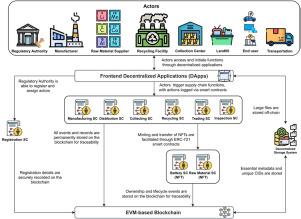Blockchain and NFTs: Revolutionizing critical material recycling from end-of-life lithium-ion batteries
IF 6.4
Q1 ENVIRONMENTAL SCIENCES
引用次数: 0
Abstract
Lithium-ion batteries (LIBs) have become a cornerstone of modern technology, where they serve as the power source for a wide range of applications, including electric vehicles and renewable energy storage systems. However, rapid production growth has introduced challenges regarding end-of-life management, particularly with waste disposal, resource recovery, and environmental sustainability. Inefficient recycling often leads to valuable materials like cobalt, lithium, and nickel being discarded in landfills, which exacerbates resource scarcity and poses environmental and health risks. To address these issues, there is a critical need for more efficient, transparent, and accountable systems for the collection, recovery, and recycling of LIBs. In this paper,A blockchain and Non-Fungible Token (NFT)-based solution is proposed to enable circular recycling and material recovery. This system improves transparency, traceability, and accountability throughout the battery lifecycle. The smart contracts (SCs) source code is made publicly available on GitHub.

区块链和nft:彻底改变报废锂离子电池的关键材料回收
锂离子电池(LIBs)已经成为现代技术的基石,它们是包括电动汽车和可再生能源存储系统在内的广泛应用的电源。然而,产量的快速增长也带来了报废管理方面的挑战,特别是在废物处理、资源回收和环境可持续性方面。低效的回收往往导致钴、锂和镍等有价值的材料被丢弃在垃圾填埋场,这加剧了资源短缺,并构成环境和健康风险。为了解决这些问题,迫切需要建立更高效、透明和负责任的lib收集、回收和再循环系统。本文提出了一种基于区块链和不可替代令牌(NFT)的解决方案,以实现循环回收和材料回收。该系统提高了整个电池生命周期的透明度、可追溯性和问责性。智能合约(SCs)源代码在GitHub上公开提供。
本文章由计算机程序翻译,如有差异,请以英文原文为准。
求助全文
约1分钟内获得全文
求助全文
来源期刊

Resources, conservation & recycling advances
Environmental Science (General)
CiteScore
11.70
自引率
0.00%
发文量
0
审稿时长
76 days
 求助内容:
求助内容: 应助结果提醒方式:
应助结果提醒方式:


